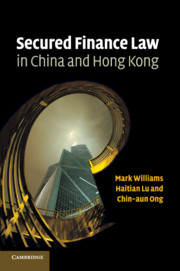Book contents
- Frontmatter
- Contents
- Preface
- Table of cases
- Table of legislation
- 1 Introduction
- 2 Security over tangible personal property
- 3 Security over intangible personal property
- 4 Company security over personal property
- 5 Hire-purchase, leasing and conditional sale of tangible personal property
- 6 Priority of security interests over personal property
- 7 Enforcement, and creditor's remedies
- 8 Conclusion
- Index
8 - Conclusion
Published online by Cambridge University Press: 03 May 2011
- Frontmatter
- Contents
- Preface
- Table of cases
- Table of legislation
- 1 Introduction
- 2 Security over tangible personal property
- 3 Security over intangible personal property
- 4 Company security over personal property
- 5 Hire-purchase, leasing and conditional sale of tangible personal property
- 6 Priority of security interests over personal property
- 7 Enforcement, and creditor's remedies
- 8 Conclusion
- Index
Summary
Validation of the hypothesis
In Chapter 1, the hypothesis of this book was postulated in the following terms:
the credit security legal frameworks governing security over personal property in domestic credit security arrangements in Hong Kong and China are not efficient if they fail to promote effectively the functions of (i) reducing the financial risk of the secured creditor, (ii) asset utilisation, (iii) fraud prevention and (iv) cost minimisation through four functional mechanisms, namely (a) creation, (b) perfection, (c) publicity and (d) enforcement of such security.
To test this hypothesis, a set of criteria was also established. In Chapters 2–7 these criteria were applied to the creation, perfection, publicity and enforcement of various types of traditional and quasi-security device in respect of tangible and intangible personal property in Hong Kong and China.
On the basis of these findings, we conclude that the hypothesis has been established in both jurisdictions. In other words, the existing credit security legal frameworks governing security over personal property in Hong Kong and China are inefficient.
To substantiate this conclusion, the following discussion collates the findings and highlights the strengths and weaknesses of the existing credit security legal frameworks of Hong Kong and China as they relate to the four functional mechanisms of creation, perfection, publicity and enforcement of security.
- Type
- Chapter
- Information
- Secured Finance Law in China and Hong Kong , pp. 374 - 406Publisher: Cambridge University PressPrint publication year: 2010



